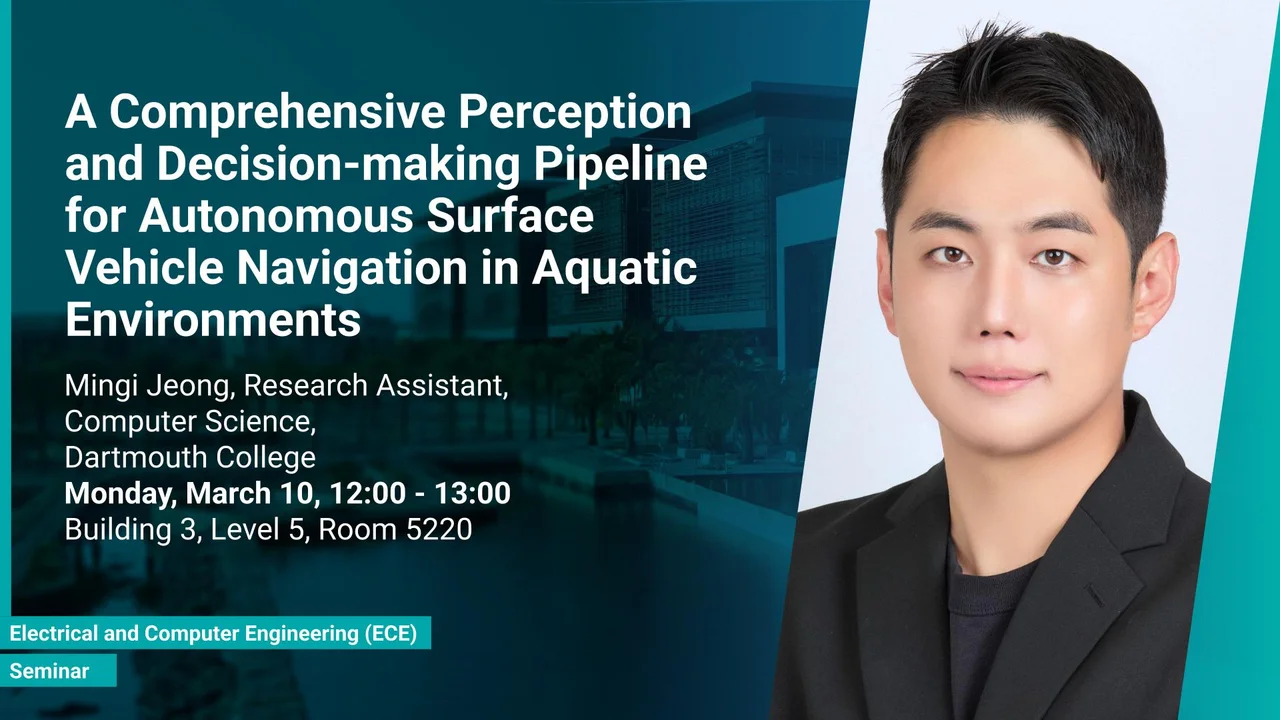
A Comprehensive Perception and Decision-making Pipeline for Autonomous Surface Vehicle Navigation in Aquatic Environments
This talk addresses the challenges hindering widespread adoption of Autonomous Surface Vehicles (ASV), focusing on safety and robustness, and presents perception and decision-making frameworks, including LiDAR-based obstacle detection, adaptive collision avoidance, and ASV deployment for water quality monitoring, concluding with open problems for future research.
Overview
Why, despite the rapid advancement of autonomous systems, do Autonomous Surface Vehicles (ASVs) still face barriers to widespread adoption? In this talk, I will discuss key challenges related to safety and robustness and present comprehensive perception and decision-making frameworks to enhance ASV navigation. First, I will introduce a maritime situational awareness algorithm for stable LiDAR-based in-water obstacle detection, which remains robust despite data sparsity in the maritime domain through efficient connected clustering. Second, I will discuss adaptive ASV collision avoidance algorithms for congested traffic, where other vehicles may not cooperate and role conflicts may arise. By leveraging motion attribute-based clustering and an intention-aware deep learning approach, these methods achieve fast computation and enhanced safety, even in the presence of multiple obstacles and uncertain vessel intentions. Then, I will present my interdisciplinary work on designing and deploying ASVs for reliable sensing and water quality monitoring, accounting for sensor data quality and robotic constraints. Throughout my talk, I will highlight field experiments demonstrating real-world applications and share key lessons learned. I will conclude with a discussion on open problems, including reliance-aware perception, planning, and navigation in non-static environments influenced by external disturbances. These problems align with my vision of developing a unified framework that enables long-term, robust autonomy in dynamic environments across multiple domains, including aerospace and ocean systems.
Presenters
Mingi Jeong, Research Assistant, Computer Science, Dartmouth College, USA
Brief Biography
Mingi Jeong is a Ph.D. candidate in Computer Science at Dartmouth College, advised by Prof. Alberto Quattrini Li. His research focuses on intelligent systems capable of robust, persistent decision-making in complex and unstructured environments, with an emphasis on autonomous surface vehicles (ASVs). His work aims to drive societal impact in areas such as environmental monitoring, search and rescue, and transportation. He served as a Chief Navigation Officer at Hyundai Merchant Marine, operating LNG tankers and container vessels, including work in dry docks and shipbuilding, under a connected service with the Korean Navy. As a cadet, he was an exchange student at New York Maritime College under the U.S. Coast Guard licensing regimental system. His research has been field-tested in real-world environments, including New England lakes, Boston Harbor, Busan Port, and the Caribbean Sea, and has been utilized by limnologists, biologists (e.g., the Lake Sunapee Protective Association), and industry partners such as SeaMachines Robotics. His recent projects have been funded by NOAA SeaGrant Fellowship. He was selected as a Robotics: Science and Systems (RSS) Pioneer (2024) and is a recipient of the Future Ocean Technologist Award from Korea’s Ministry of Oceans and Fisheries.